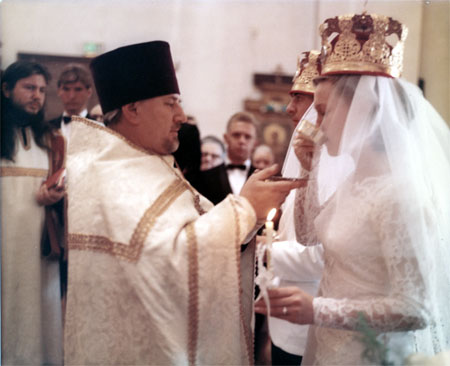 OF THE PRINCIPAL MYSTERIES, two are experienced only by individuals called into special states within the Body of Christ. The previous chapter discussed Holy Orders; the other is Holy Matrimony. It is sometimes erroneously assumed that all Christians are called to be married unless (if this is even considered) they perceive some specific call to monastic celibacy — the state of consecrated sexual abstinence. It may be more legitimately supposed that the contrary is true — for indeed we all enter life as virgins, and are expected by the Tradition of the Church to remain in that state unless and until we are clearly called into marriage and that call is blessed. In general, the Church blesses two paths, both of which find their primary purpose in the struggle for salvation: marriage and monasticism or celibacy.
OF THE PRINCIPAL MYSTERIES, two are experienced only by individuals called into special states within the Body of Christ. The previous chapter discussed Holy Orders; the other is Holy Matrimony. It is sometimes erroneously assumed that all Christians are called to be married unless (if this is even considered) they perceive some specific call to monastic celibacy — the state of consecrated sexual abstinence. It may be more legitimately supposed that the contrary is true — for indeed we all enter life as virgins, and are expected by the Tradition of the Church to remain in that state unless and until we are clearly called into marriage and that call is blessed. In general, the Church blesses two paths, both of which find their primary purpose in the struggle for salvation: marriage and monasticism or celibacy.A legitimate choice for marriage does not come in the form of succumbing to the forces of our sensual nature. Rather, it is something to be perceived in prayer and counsel. It may well be accompanied by no overwhelming romantic feelings whatever — indeed, the presence of such feelings can only serve to cloud our ability to discern the genuineness of the call. It is precisely because of this emotional clouding that it is almost always best to seek and hear prayerfully the counsel of hearts wiser and more mature than our own.
The state of marriage is something so central to the life of the Church that her members are normally permitted to marry only other committed believers. It is equally apparent from the Apostolic teaching and the Tradition of the Church that in a Christian context "marriage" has not the same meaning as it does for the world. First and foremost, Christian marriage is an embodiment, an icon of the relationship between Christ and the Church. At the same time and in the same way, it is the simplest, most basic unit of the Church: that fundamental congregation in which "two or three are gathered together in My name." It exists, neither for the procreation of the human race nor for the well-being and good order of "society," but rather for the living of the life of the faith, for mutual support and encouragement in that life and the growth toward salvation — and for the nurturing of Christian children.
The bond formed by sacramental marriage is by nature timeless, one which admits of no conditions in either time or behavior. The Church knows of no such thing as a contract in which are specified the rights and obligations of each partner. The Christian charter for marriage is given us clearly in the Holy Scriptures and in the rite of marriage itself. The Scriptures are perhaps more exhaustive in this area than in any other area of human behavior. We are told at quite some length how husbands and wives are to behave toward one another and their children.
Despite the timeless character of marriage, Orthodox Tradition has long recognized that there are circumstances in which there is no hope whatever for a marriage to fulfill even a semblance of its true character. In such cases, the Church permits the victims of such "dead" marriages to remarry if, in the prayerful judgment of the bishop, the remarriage is justified and likely to be a truly Christian union.
The Church’s celebration of marriage, of the creation of a new icon of her life in Christ, is lavish. A complete description of the service is out of place here, but let us at least note that the rites prescribed for this celebration are amongst the most elaborate of the Church’s festivities. The union of man and woman is celebrated with the placing of rings on both, the crowning of both, and the sharing of a cup of blessed wine.
The bestowal of the Church’s blessing upon a marriage, with the use of the material tokens mentioned above, is the function of the priest. The full meaning of this Mystery suggests that both parties to the marriage are truly "members of Christ." Nevertheless the Church has permitted the celebration of marriages of Orthodox Christians with non-Orthodox Christians.
Like any of the Mysteries, Christian marriage is more than just a celebration of something which already exists. It is also the creation of something — the imparting to the couple of that Grace which transforms them from a couple into husband-and-wife, into the image and reflection of the love between our Lord and His Church. The two individual lives are bound together in the Church as part of the Body of Christ. The two are no longer two, but one, created a single member of the Body of our Lord, to live a unified life in witness to the oneness to which we are all called in Him.
-Bishop Alexander (Mileant) ROCOR








No comments:
Post a Comment